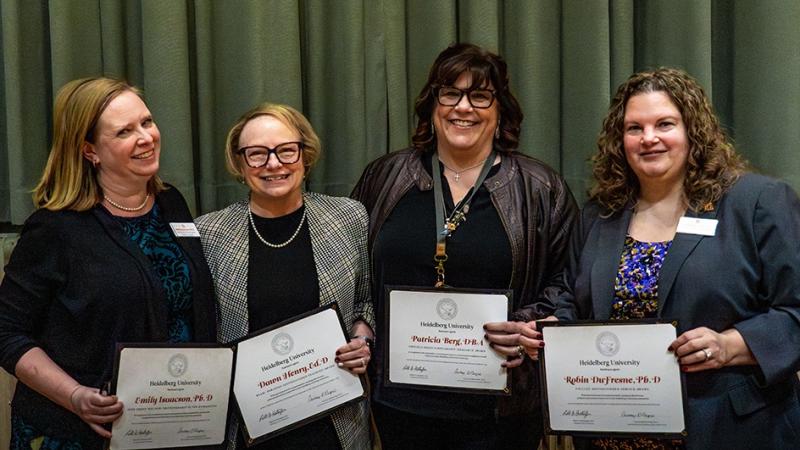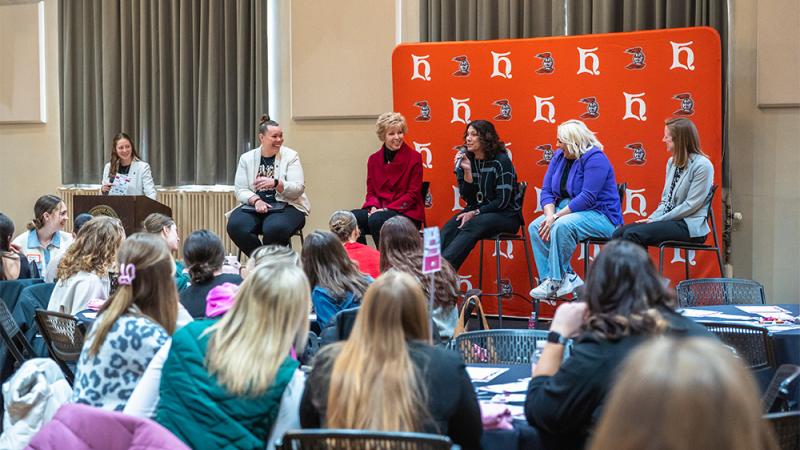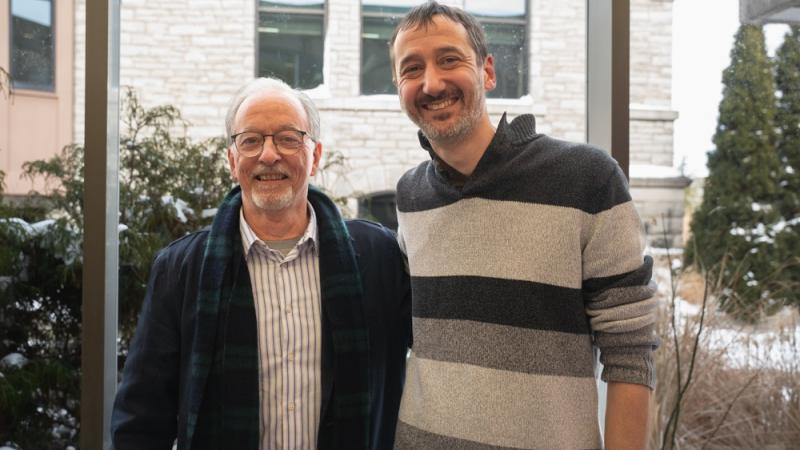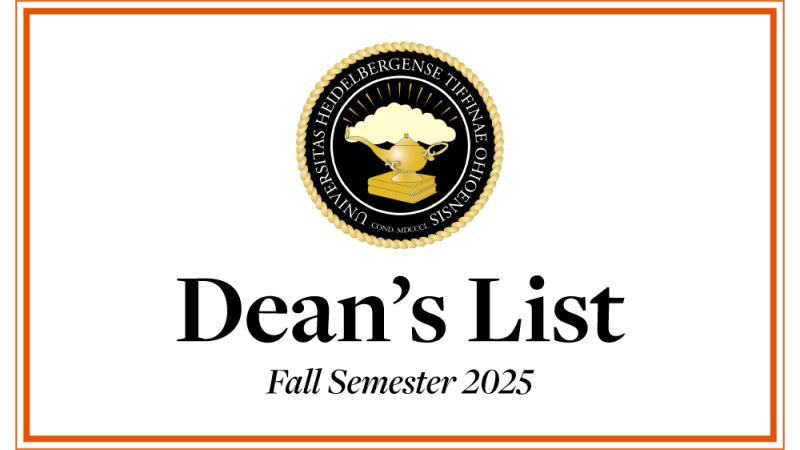With Owen Center support, 'Berg successfully navigates COVID-19 changes
When President Huntington wrote his first letter to the campus community on march 6, 2020, about travel, we were just starting to learn more about COVID-19 and the changes it would force upon our lives. Now, as the semester comes to a conclusion in ways none of us likely could have conceived, we take a step back and look at ways we navigated through these two months by supporting each other.
A stabilizing force in providing strong support for students and faculty, the Owen Center for Teaching and Learning has emerged at a time when new (permanent) Executive Director Dr. Courtney DeMayo Pugno was getting acclimated, new staff were coming on board. The entire campus was asked to pivot to an entirely online teaching and learning environment.
We asked Courtney to reflect on these unusual times and the challenges and successes – mostly successes – she’s witnessed from faculty and staff as we all were thrust into new ways of teaching and learning, and what the CTL’s priorities will be going forward.
Q: What are some of the significant ways the Owen Center team had to “pivot” in the services and support you provided for students at the onset of COVID-19 and since?
Courtney: The Owen CTL has done a lot to support students. I’m really proud of the work Morgan Harrigan has been able to do in this area, considering that she started in her new position as the Director of Academic Support in the midst of the COVID-19 pandemic. Here’s what we’ve done:
We launched a regular mode of communication, our biweekly newsletter for students, so that we can share regular tips and hints to help all students be successful in the midst of remote learning.
Morgan created a guide to remote learning for students, which we then circulated to students, coaches, and faculty to make sure the guide got into student hands.
We transitioned all academic support to remote, using Google Hangouts and Google docs as the primary mode of delivery for students. This enabled us to provide continuity of service in the following areas:
- Supplemental Instruction for PSY 101, BIO 122, BIO 123, BIO 124,
CHM 112 - Writing Center Consultations
- Academic Coaching
- Math Tutoring
We continued to coordinate the 8-week and 12-week appraisals, and conducted direct outreach to all students who were flagged with Ds or Fs in their appraisals. We tried to connect students with academic support resources that were specific to their needs.
We coordinated communication between faculty about students who seemed to have a hard time with the transition to remote learning and did targeted outreach to students when appropriate and/or necessary.
Douglas Stoll continues to provide accessibility support for students using Google Hangouts as his primary mode of communicating with students.
Mark McKee continues supporting student internships, though those have been seriously disrupted.
We coordinated department-based academic advising sessions to help students select and register for classes for the Fall of 2020. In partnership with academic departments, the Owen CTL
collaborated on remote advising sessions using Zoom.
- Lindsey Baumgartner, Academic Advising Specialist, and I also had individual meetings with students to help them select their classes for the following semester.
- Between March 26 and registration week, the Owen CTL worked with 430 unique students to help them prepare for registration. Between the collaborative sessions with academic departments and individual appointments, we met with 569 students (obviously there are some repeat students in that number). Lindsey had 89 individual advising appointments and I had 100 individual advising appointments.
Q: Same question but for faculty.
Courtney: In terms of support for faculty, the Owen CTL has done quite a bit as well. Rebecca Taylor Frank and I wrote the Teaching Continuity Plan, which guided all faculty through the pivot to remote teaching.
Rebecca and I utilized the “drop-in hours” model for faculty support that she developed when HU rolled out Canvas. We hosted drop-in faculty support hours, open times in which all instructors could come into the BAR computer lab, work on transitioning their courses to remote instruction, and get help with any issues that arose as they were transitioning. In those drop-in hours, we helped faculty set up Canvas shells, learn new technology tools, develop short videos for their classes, create communication plans for students, modify their class sessions, etc.
The CTL offered faculty ongoing/on-demand faculty support even when classes resumed after spring break. Faculty support was provided via email, Zoom sessions, and phone calls. We stopped tracking faculty support sessions on April 3. Between March 12 and April 3, Rebecca and I had 301 individual consultations with faculty to help them transition and acclimate to remote instruction.
We provided a consistent stream of information for all instructors. I pulled a list of instructors from Argos, and beginning during spring break, sent a daily email update from the CTL. The daily updates included any new information instructors needed to be aware of, tips regarding the transition to remote instruction, and the occasional humorous video, meme, or photo. The goal of those emails was to keep in constant communication with faculty so that, even if they didn’t need our help, they knew we were there to help them. We wanted to make sure every member of the HU faculty felt supported. Once people started settling into the new routine, we stopped emailing daily, and instead went to weekly emails. We still provide updates and information, but the needs are less urgent and constant, so we scaled back.
The CTL provided faculty advisors with advising guidelines to use when students are interested in the revised Pass/Fail policy. We worked with Athletics, Financial Aid, the Academic Affairs Leadership Team, and the Registrar’s Office to get that guide put together and shared with faculty.
The CTL has also revised a training course that we developed with faculty and administrative colleagues. The “Learning Online Teaching and Learning” course was developed by Rebecca, me, Dr. Lucy Biederman, and Dr. Karen Estridge in Spring of 2019. The course teaches faculty best practices in online instruction. We will be running that course this summer for all HU instructors.
Q: A lot has been asked of both faculty and students in transitioning to online classes. What’s your assessment of how everyone handled this?
Courtney: I’ve been incredibly impressed with how everyone has handled the transition.
First, faculty … just, wow. The way our colleagues banded together to support one another, the kindness and consideration they show for one another and their students has been nothing short of inspiring. They have stepped up to answer one another’s questions, share resources, and support one another both physically/emotionally and pedagogically.
Now for students … overall they’ve done amazingly well. They had their entire lives uprooted they had to move out of the dorms, transition to a new type of learning, reacclimate to living at home (wherever that is and whatever it looks like), and cope with the pandemic that has severely limited their ability to do anything other than be at home. Now, they’re learning remotely while juggling all of the responsibilities they have – caring for younger siblings, helping support their families financially, caring for parents or grandparents, working full time, etc.
I just hope both students and faculty are taking the time to do some self-care. This is a serious trauma that we are all dealing with, and trauma affects our abilities to make decisions, to learn, etc.
Q: All of this has taken place while you were building your team and you were transitioning to Executive Director (without the interim). What can you tell us about your team’s strengths, their creativity, their commitment to the task, their collaboration?
Courtney: Well, I would have loved the opportunity to acclimate to this new position in a regular semester. It felt kind of like a battlefield promotion. I was appointed permanently to this position in the middle of the transition to remote teaching. But, it is what it is.
The Owen CTL team is nothing short of incredible. The entire team banded together with a unified vision and purpose: support every single instructor and every single student. Period. Anything I asked of them, any idea I ran by them, the answer was always “yes, and…” When I was appointed as Interim Executive Director, I told the CTL staff I wanted us to be greater than the sum of our parts. This pandemic showed me that we are much, much greater than the sum of our parts. I’d like to talk about each person individually:
Rebecca Frank, Instructional Technologist – she approaches every pedagogy question with a practicality grounded in years of teaching experience. Because she understands how faculty members think and the logistics of managing/teaching a class, she is able to provide faculty members with concrete suggestions for how to solve their teaching problems. And, because of her classroom experience, she leads with sound pedagogy.
Douglas Stoll, Coordinator of Student Accessibility Services – if Douglas had a superpower, it would be empathy. Every question, issue, or problem he approaches when working with a student is guided by a deep and profound sense of empathy and a genuine desire to support and help all members of the HU community.
Morgan Harrigan, Director of Academic Support -- Morgan started this job (literally) right before we went to remote instruction. She has an incredible work ethic and drive, she is eager to learn and has fantastic ideas about how to improve academic support and better support all students. I can’t wait to see what she will do in this new role.
Amy Hammit, Administrative Assistant -- Amy is the glue that holds the entire office together. Seriously, anything that needs to be done, she does. She manages all of the student payroll, handles the scheduling, and supports everyone in the office. She’s hilarious and hardworking and bright.
Q: What have been a few of the challenges you all have encountered and how have you solved them?
Courtney: Challenges: Supporting the entire faculty as they transition from face to face to remote teaching. Supporting the entire student body as they learn how to learn remotely. Helping about three-quarters of our student population register for classes in the fall semester with only one full time advisor. Figuring out what my job even actually is and learning what all I have to do and how to do it.
How have we solved them? Well, we didn’t really have a choice. I laid out all of the stuff we did in my responses to #1 and #2. Honestly, I put my head down and did the work. If there was a problem I didn’t know how to solve, I gathered input from people who know more than me (that’s most people, for what it’s worth), I wrote notes on the giant whiteboard in my office, and then periodically revisited them to see what kinds of ideas they generated. Then, I’d run my ideas by other people who know more than me (again, most people) and if they were good ideas, I’d run with them. I relied pretty heavily on my own experience as a Heidelberg faculty member and the research I’ve done since starting the CTE a year and a half ago.
Q: Thinking back just 2 months, where we are now was kind of inconceivable, yet, here we are, at the end of the semester. When we all look back on this (and we will!) what will you remember as rewarding … working with faculty, supporting students, and working with your team?
Courtney: Hmmmm ... This is probably going to sound weird, but I’ve actually found this entire experience rewarding. OK, not the whole “being stuck at home and having my kids disrupt literally every meeting I’ve had since I’ve been home” part. But, I have a great sense of pride and accomplishment from everything we’ve been able to pull off this semester. It’s been really stressful. And tiring. And frustrating. And I definitely drink more wine than I normally would. But I am so, so proud of what the CTL team has done. And I’m really proud of what I’ve done in such a short time. So, what’s rewarding? All of it. Working with faculty, working with students, working with my CTL team.
Q: Given that we don’t know yet what the fall semester will look like, what are some of the Owen Center’s planning priorities and activities for this summer?
Courtney: Because the CTL supports all students and all faculty, we have a few simultaneous planning priorities for the fall semester.
We need to prepare every single HU instructor for the possibility of having to teach online. This is where the Learning Online Teaching and Learning course comes in. It’s a fully asynchronous online course that will teach faculty best practices in online learning while they prepare materials for their own online courses.
- By preparing faculty for fully online instruction, we are basically preparing them for the worst-case scenario. If it turns out that we can reopen campus normally, then they learn tools and strategies that they can modify for face-to-face instruction or use to cover classes when a faculty member is ill or out of town or whatever.
We need to create schedules for every single incoming student, so we are collaborating with Student Affairs on Orientation (whether Orientation be face-to-face or remote).
We need implement a new academic advising system, which will utilize faculty advising fellows to work with most incoming first-year students. The goal of this new system is to build better connections between the Owen CTL and faculty departments, as well as between first-year students and their faculty.
- The Advising fellows are: Dr. Greg Ramsdell, Dr. Marc O’Reilly, Dr. Traci Stark, Andrea Roerdink, and Dr. Stacey Pistorova. They will each be advising students from their own academic areas.
We need to re-evaluate our Academic Support offerings and implement revisions to improve them.
- This includes making changes to Supplemental Instruction, increasing the collaboration between the CTL and Athletics so we can integrate academic support into athletics teams, and partnering with departments to integrate academic support into academic departments.
- We are also launching a Quant Center, modeled on the Writing Center, which will support student learning in any discipline that utilizes quantitative literacy. The Quant Center will be developed and run by Dr. Lindsey Haubert.
- We need to prepare Academic Support for the possibility of continued remote delivery, and evaluate what we did this semester and improve it.
We need to develop and refine the Academic Alert system using Guardian (the conduct software used by Residence Life, Title IX, etc.)
We need to revise and improve the quality of information gathered in the 4-week, 8-week, and 12-week appraisals.




